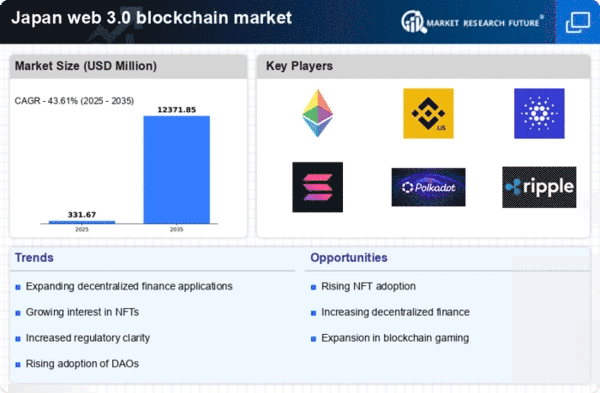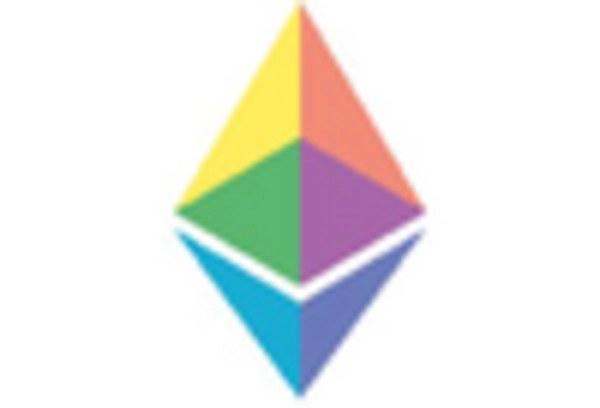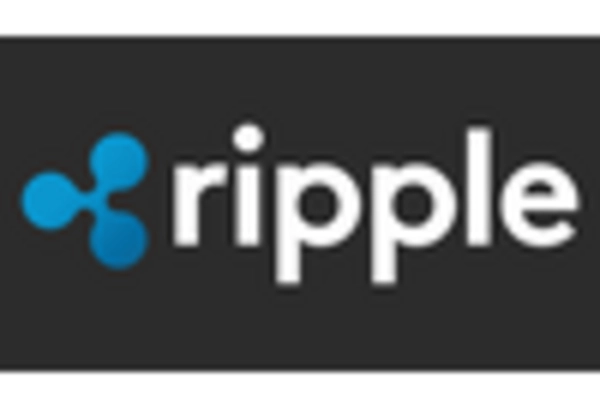Rising Interest in Digital Assets
The web 3-0-blockchain market in Japan is experiencing a notable surge in interest surrounding digital assets, particularly cryptocurrencies and non-fungible tokens (NFTs). This trend is driven by a growing number of retail and institutional investors seeking to diversify their portfolios. As of November 2025, approximately 15% of Japanese adults have invested in cryptocurrencies, reflecting a significant increase from previous years. The allure of potential high returns, coupled with the increasing acceptance of digital currencies in everyday transactions, is likely to further propel this market. Additionally, the Japanese government has been exploring regulatory frameworks that could enhance the legitimacy of digital assets, thereby fostering a more robust ecosystem for the web 3-0-blockchain market. This evolving landscape suggests that the appetite for digital assets will continue to expand, influencing market dynamics in the coming years.
Technological Advancements in Blockchain
Technological innovations are playing a crucial role in shaping the web 3-0-blockchain market in Japan. The development of more efficient consensus algorithms, enhanced scalability solutions, and improved interoperability between different blockchain networks are driving this evolution. As of November 2025, several Japanese tech firms are investing heavily in research and development to create next-generation blockchain solutions. For instance, advancements in layer-2 scaling solutions are expected to increase transaction throughput significantly, potentially reducing costs by up to 30%. These technological improvements not only enhance the functionality of blockchain applications but also attract more businesses to adopt these technologies. Consequently, the ongoing technological advancements are likely to create new opportunities and applications within the web 3-0-blockchain market, further solidifying its position in the digital economy.
Regulatory Clarity and Support Initiatives
Regulatory clarity is becoming a pivotal driver for the web 3-0-blockchain market in Japan. The government is actively working to establish a supportive regulatory framework that encourages innovation while ensuring consumer protection. As of November 2025, recent initiatives have been introduced to streamline the approval processes for blockchain projects, which could potentially reduce time-to-market by 20%. Furthermore, the Financial Services Agency (FSA) is engaging with industry stakeholders to develop guidelines that promote responsible use of blockchain technology. This proactive approach not only enhances investor confidence but also attracts foreign investment into the Japanese blockchain ecosystem. As regulatory support continues to evolve, it is likely to create a more conducive environment for the growth of the web 3-0-blockchain market.
Growing Demand for Transparency and Security
In an era where data breaches and fraud are prevalent, the demand for transparency and security in transactions is becoming increasingly critical. The web 3-0-blockchain market in Japan is responding to this need by offering decentralized solutions that enhance trust among users. As organizations and consumers alike seek to ensure the integrity of their transactions, blockchain technology provides a robust framework for secure data sharing and verification. Recent surveys indicate that over 70% of Japanese businesses are considering blockchain solutions to improve their operational transparency. This growing emphasis on security and transparency is likely to drive further adoption of blockchain technologies across various sectors, including finance, healthcare, and supply chain management, thereby reinforcing the web 3-0-blockchain market's relevance in Japan.
Increased Collaboration Among Industry Players
The web 3-0-blockchain market in Japan is witnessing a trend of increased collaboration among various stakeholders, including startups, established corporations, and academic institutions. This collaborative environment is fostering innovation and accelerating the development of blockchain applications. As of November 2025, numerous partnerships have emerged, aimed at leveraging collective expertise to tackle challenges and explore new use cases. For instance, joint ventures between tech companies and financial institutions are focusing on creating blockchain-based solutions for cross-border payments, which could reduce transaction times by up to 50%. Such collaborations not only enhance the technological capabilities of the web 3-0-blockchain market but also promote knowledge sharing and resource pooling, ultimately driving growth and adoption.
















